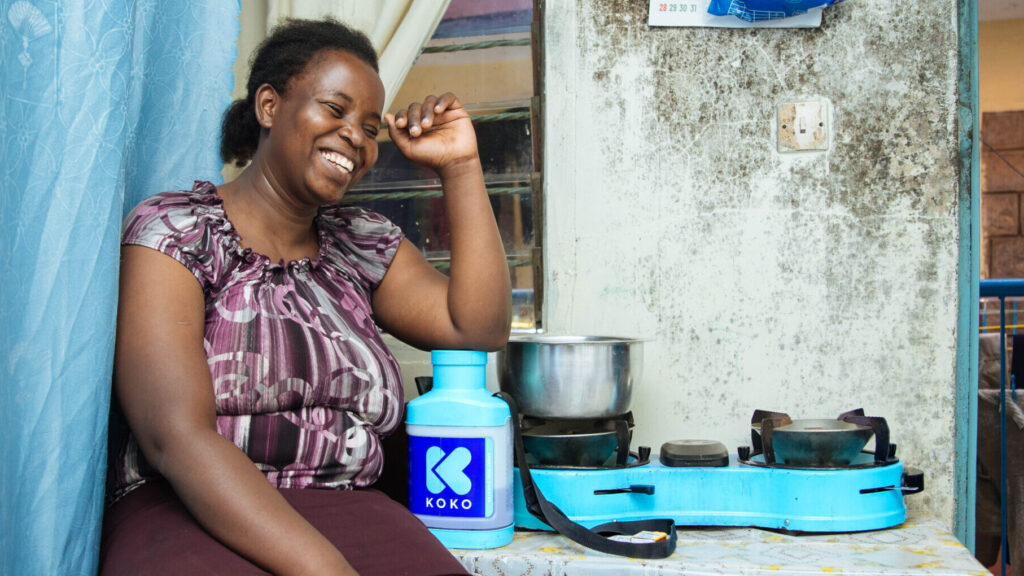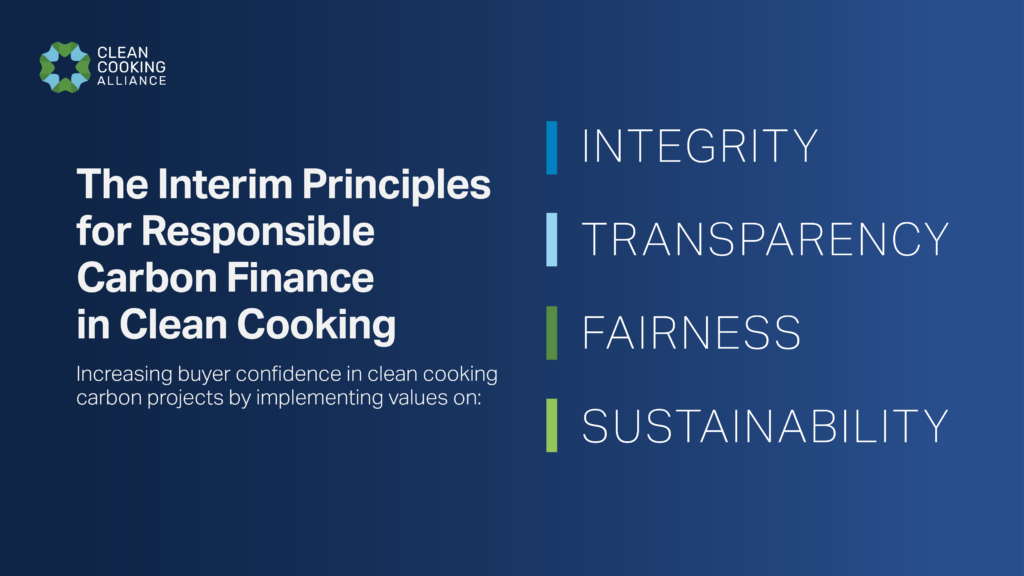Navigate this page
Please click here for guidance on submitting your feedback on the Interim Principles for Responsible Carbon Finance in Clean Cooking. The consultation window will be open from November 28, 2023, to January 31, 2024.
Click here to download a copy of the Thematic Report for Responsible Carbon Finance. Watch the webinar launch of the Interim Principles here (slides here).
The climate crisis will not be solved without clean cooking. Yet this global crisis remains critically underfunded.
Carbon markets are a powerful tool to get more capital flowing in a cost-efficient way, estimated to generate up to $25 billion in capital for clean cooking in the next 25 years. This funding could significantly drive down costs for customers, enabling companies to grow faster and expand into new markets while delivering the widespread benefits of clean cooking.
However, carbon markets depend upon the reputational benefits that engaging in them offers to carbon credit buyers, and the quality of carbon credits across the voluntary carbon market is currently under scrutiny. If perceived risks outweigh the perceived benefits, investors and buyers will step back.

CCA is addressing this challenge by promoting responsible carbon finance. By 2026, CCA aims to have a mixture of established, emerging, and new clean cooking project developers committed to a code of conduct that is recognized by end buyers of carbon credits as a hallmark of high quality.
By 2030, CCA envisions a mature, flourishing clean cooking carbon market that operates with integrity, transparency, fairness and sustainability, where buyers trust that they get what they buy in terms of emission reductions and co-benefits. This sustained demand for high quality credits will command premium pricing, facilitating the allocation of significant capital to clean cooking carbon projects.
The CCA-led Responsible Carbon Finance Working Groups have established 12 Interim Principles, with the underpinning values of integrity, transparency, fairness, and sustainability. Once adopted by the market, these Principles can help improve market norms; instill confidence in clean cooking carbon markets; and incentivize investment.
The Interim Principles for Responsible Carbon Finance in Clean Cooking
Integrity
Project claims are evidence-based, case-specific, and substantiated.
- Project developers use baselines that are realistic and geography-specific. Any assumptions made are conservative.
- Project developers accurately monitor fuel consumption or stove usage. Any assumptions made are conservative.
- Project developers claim only those co-benefits that are substantiated and can be evidenced.
Transparency
Non-commercially sensitive information on clean cooking carbon markets is accessible.
- Market actors are transparent about the proportion of carbon revenue reaching actors further down the value chain.
- Market actors enable buyers to reflect co-benefits in carbon credit prices.
Fairness
Carbon projects solicit informed consent from users and share revenue fairly along the clean and improved cooking value chains.
- Project developers actively engage users in the design of projects.
- Project developers ensure users make informed decisions on their participation at the start of a carbon project.
- Project developers share carbon revenue with users in recognition of their role in generating emissions reductions.
- Investors and intermediaries earn carbon revenue that is proportionate to the value they add and the risks they assume.
Sustainability
Carbon markets complement other forms of funding and do no long-term harm to local clean and improved cooking markets.
- Providers of official development assistance and philanthropic capital ensure their funds are complementary with carbon finance.
- Project developers avoid creating excessive market distortion in clean and improved cooking markets.
- Governments create an enabling environment to incentivize the development of national clean and improved cooking carbon markets.
Process
To date, the Working Groups have benefited from the collective inputs of 537 members representing 267 institutions across the clean cooking and carbon financing landscape. These volunteers included project developers, carbon credit sellers and re-sellers, service providers, market facilitators, consultants, carbon standards, and end buyers of carbon credits.
CCA is leading a five-stage process from May 2023 to December 2030, as outlined below:
| Phase | When? | What is the main output? | Why is it important? | Who is involved? |
Discover |
Q2 2023 | Thematic Report
Detailing all the material issues experienced today, from across all the clean cooking subsectors. |
Confirming the key risks and issues facing clean cooking carbon markets will help to inform where the sector needs to improve if it is to improve carbon credit quality. | Open call for participants resulted in 537 working group members from 267 institutions across the clean cooking and carbon financing landscape. |
|
Describe |
Q3 2023 | Interim Principles
Confirming the initial set of Interim Principles that will be released for wider industry consultation. |
Creating a set of Interim Principles that are material, transformational, clean cooking-specific, and operationalizable will lay the ground for a future Code of Conduct to emerge. | Opinions received from: 8x Industry Co-Chairs, one national government, and two end buyers of carbon credits.
Playback given to all Working Group participants. |
Co-create |
Q4 2023 – Q3 2024 | Public Consultation Schedule for Code of Conduct
Co-creating a Code of Conduct with project developers that is aspirational yet practical. |
Adjusting the Principles and co-create the underlying details through market consultation will help increase uptake amongst project developers and ecosystem actors. | Involvement sought from:
|
Scale |
Q2 2024 – Q4 2025 | Code of Conduct Commitments
Confirming commitments and connecting the Code of Conduct within the wider carbon market ecosystem. |
Increasing awareness of the Code of Conduct amongst end buyers will help them to find project developers that are taking extra steps to improve clean cooking project quality. | |
Sustain |
2026 – 2030 | Code of Conduct Revisions
Refining the Code of Conduct to tighten quality hallmarks. |
Improving the levels of quality needed to be part of the Code of Conduct will create a ratchet for quality that keeps apace of the latest sector developments. |


